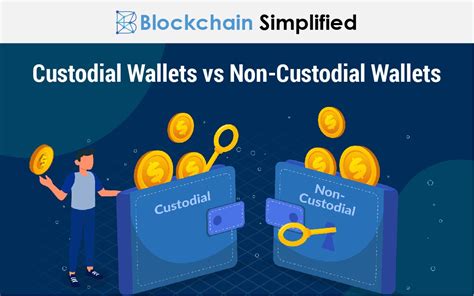CRYPTOCURRENCY
Custodial Services Vs. Non-Custodial Wallets: Which To Choose?
The Great Custodial Service Debate: Cryptocurrency – Custodial Services vs. Non-Custodial Wallets
With the rise of cryptocurrencies like Bitcoin, Ethereum, and others, users are now faced with a crucial decision: which custody method is best for their digital assets. Two popular options have sparked intense discussion among crypto enthusiasts: custodial services offered by exchanges, and non-custodial wallets. In this article, we’ll delve into the pros and cons of each approach to help you decide which custody method suits your needs.
Custodial Services Offered by Exchanges
Exchanges, such as Coinbase, Binance, and Kraken, offer custodial services that provide a secure way to store and manage cryptocurrencies on their platforms. Here’s what you need to know:
- Benefits:
+ Convenience: Exchanges often have user-friendly interfaces and mobile apps that make it easy to buy, sell, and transfer cryptocurrencies.
+ Security: Exchanges typically employ robust security measures, such as two-factor authentication and encryption, to protect user funds.
+ Accessibility: Custodial services offered by exchanges can be accessed through various devices, including desktop computers, laptops, smartphones, and even smart home devices.
- Drawbacks:
+ Fees: Exchanges often charge transaction fees on buying and selling cryptocurrencies, which can eat into your profits.
+ Risk of theft: Exchanges are not entirely risk-free; if you lose access to your account or the exchange is hacked, your funds may be at risk.
+ Limited control: Custodial services offered by exchanges limit your ability to make changes to your wallet’s configuration and settings.
Non-Custodial Wallets
Non-custodial wallets, on the other hand, give users full control over their digital assets. These wallets allow you to store, send, and receive cryptocurrencies without relying on any third-party service. Here are some benefits of non-custodial wallets:
- Benefits:
+ Security: Non-custodial wallets ensure that your funds are secure and not at risk of theft.
+ Control: You have complete control over your wallet’s configuration and settings.
+ Flexibility: Non-custodial wallets enable you to easily transfer funds between accounts or use them for different purposes (e.g., sending cryptocurrency for a fee).
- Drawbacks:
+ Complexity: Non-custodial wallets require more technical expertise, as users need to understand the underlying blockchain technology and wallet management.
+ Technical issues: Non-custodial wallets can be prone to technical issues, such as wallet crashes or connectivity problems.
Which Custodial Service is Right for You?

So, which custody method is best for you?
- If you want convenience and ease of use: Exchanges may be the better choice for you. They offer user-friendly interfaces, mobile apps, and a wide range of features to make managing your cryptocurrencies as easy as possible.
- If you prioritize security and control: Non-custodial wallets are the way to go. By storing your funds in a non-custodial wallet, you ensure that your digital assets remain secure and under your direct control.
- If you’re comfortable with technical expertise: Non-custodial wallets might be the best option for you. While they require more technical knowledge, the benefits of security and flexibility make them well worth the effort.
Conclusion
The choice between custodial services offered by exchanges or non-custodial wallets depends on your individual needs and preferences. As a cryptocurrency user, it’s essential to weigh the pros and cons of each approach before making an informed decision.
Whether you prefer the convenience and security of an exchange or the flexibility and control of a non-custodial wallet, there is no one-size-fits-all answer.
